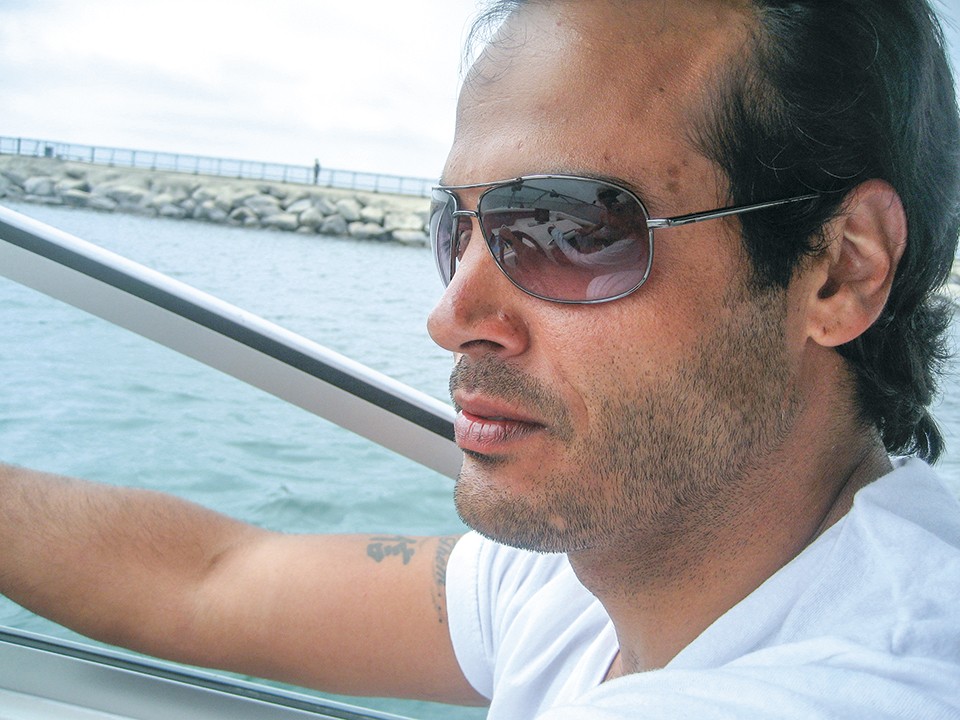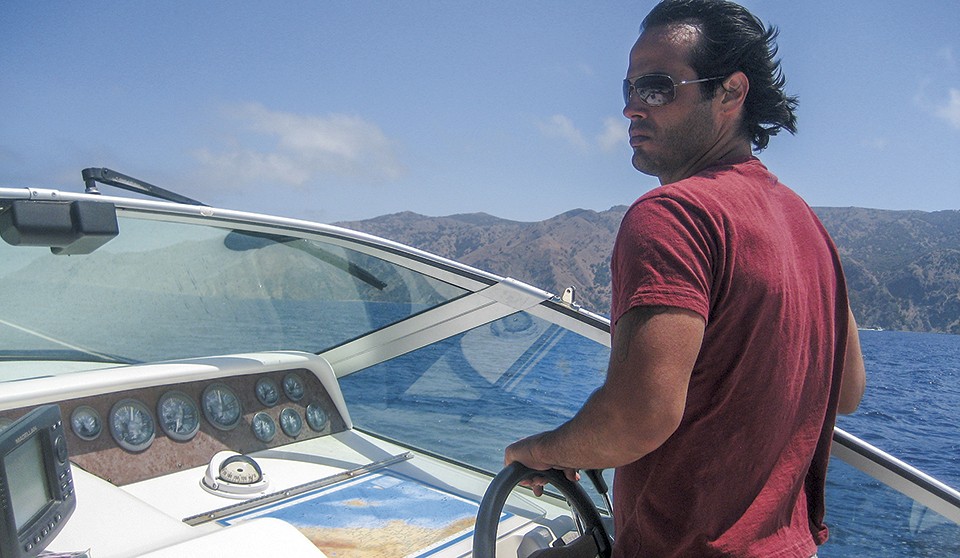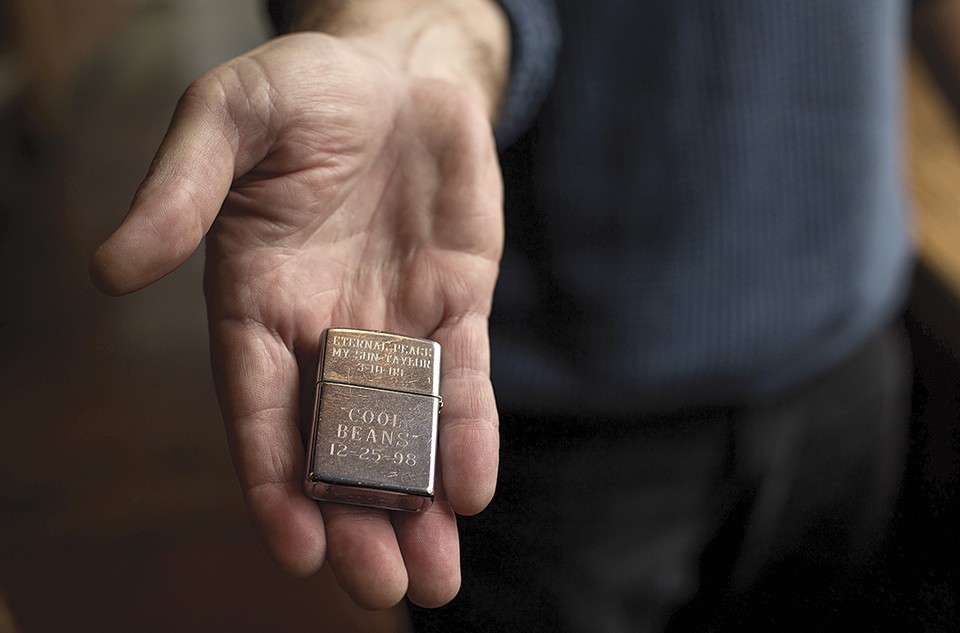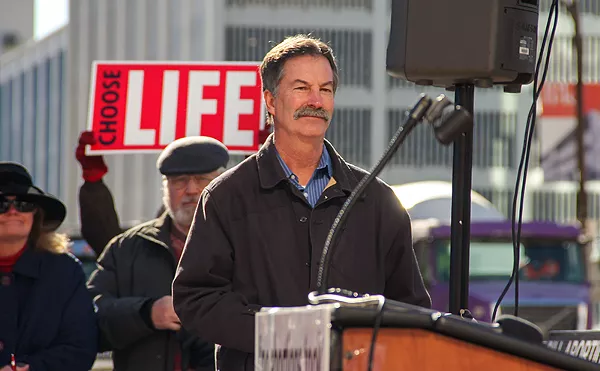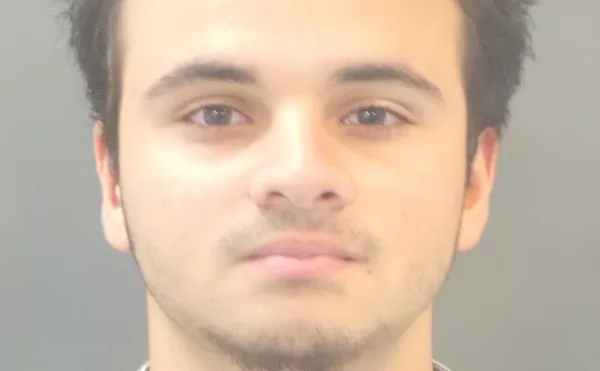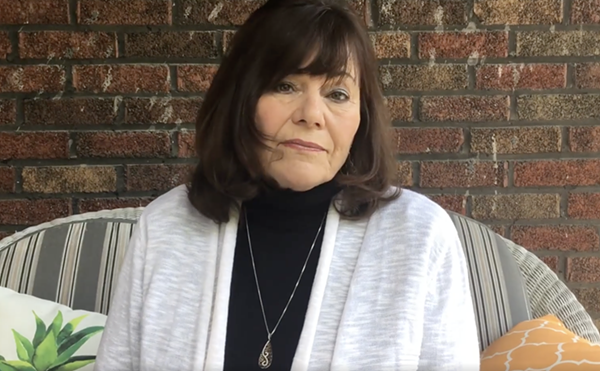After his son Taylor shot himself in 2009, a 54-year-old pool repairman named Jay Hutchinson moved to St. Louis from northern Indiana. His girlfriend taught him how to use Microsoft Word, and in a fugue of grief, a man who claims never to have read a book voluntarily spilled out a 300-page fictionalized account of his son's life. He titled it Taylor Lake, and it was both a living memorial and an unburdening. To hold a memory in one's hand might bring an end to its pain, and so in an attempt to self-publish the novel, Hutchinson met an editor on Craigslist, who took a $1,200 advance and disappeared. Then Hutchinson met Stephen Martines.
When Hutchinson met him in November 2014, Martines was smoking at the Ameristar Casino, where he regularly played no-limit poker. Martines, then 39, was good-looking, with salt-and-pepper hair. He was so good-looking, in fact, that he'd had a fan club in the early 2000s, when he acted on General Hospital and Guiding Light. Since then, Martines had played small roles in Supernatural, Vampire Diaries, Burn Notice and other TV shows. He drove expensive cars and sparkled with the kind of charm that implied unmitigated success. It wasn't clear why he'd moved from Hollywood back to his home in the St. Louis suburbs.
"I don't want to waste your time, but I'm looking for a writer," Hutchinson said, approaching him. Someone to clean up the manuscript so he could self-publish something respectable. Martines was a Hollywood actor; surely he had connections.
Hutchinson told him about the manuscript and about having previously been scammed. He admitted he didn't really know what he was doing, but that the project meant a lot to him.
Martines became animated. Appearing offended, he balked at giving Hutchinson's card to his connections, claiming that his reputation was at stake. Let me read it myself, he said. Hutchinson gave him the entire manuscript.
Not long after, Martines called Hutchinson to arrange a meeting. He loved it.
Really, he loved it. Hutchinson's story was moving, sad, beautiful. In fact, it would be perfect not on the printed page, but on screen, in a theater. As it happened, the story was exactly what Martines' production company, DTE Films, was looking for. It was the perfect genre, perfect subject matter. With a $3 million budget, it would make $6 million. In fact, forget the book. There's no money in books. We're going to make a movie out of Taylor Lake! I can get a screenwriter for $90,000. If you put in 30, I put in 30, and DTE puts in 30...
"I am thrilled about our new found journey of working together to bring this story to light, both, on screen and in paperback," Martines wrote Hutchinson on November 11, 2014. "I can't thank you enough for sharing the most tragic event in your life with me, DTE and soon to be the world ... Perhaps, this was the bookend you needed to finalize 'Taylor Lake'... And, perhaps, it was meant to be."
Martines' charisma was intense, and he spoke passionately. Hutchinson slowed him down, asserting that he only cared about the book. He wanted to hold his son's story in his hand, not to be famous. Martines backed off and offered him a deal. If Hutchinson made a $15,000 investment in the project, Martines would option his story. Martines' other company, Wildhorse Productions, would produce a first draft of the novel by February, only after which DTE Films would produce a film. Martines assured him that his team was already at work, that someone named Claire Miller was already editing the manuscript.
Still, Hutchinson was reticent. Martines urged him to trust him. "My father died in my arms, Hutch! In my arms! I understand the father-son bond." Martines gave him a contract that stipulated weekly updates about the status of book editing. Yet he kept Hutchinson at a professional length, holding meetings at the casino and acting as a middleman between Hutchinson and his team. He was eager to get Hutchinson's initial investment before his departure for LA.
Hutchinson went home and discussed the contract with his girlfriend. His pool-repair contracts looked more legally binding than the document Martines had given him, which had at least two typos. But Martines was persistent, and he was using his own name and reputation in the deal. His name was on DTE Films' IMDb page. His acting credits were real. He gave the address of his team's LA office to Hutchinson, who didn't know it was a PO box. He wanted Hutchinson to draft a screenplay. And then the line about his father... Hutch would have to sell his vintage Mustang to afford the $15,000.
"If this is a scam," he said, "it's a damn good one."
It's hard to get a clear picture of Martines. Beyond his acting credits, he keeps almost nothing in his name. He is constantly moving (he's associated with fourteen different properties since 2000, mostly in the LA and St. Louis areas), and court records show at least three evictions, most recently from a Ballwin house in October 2017. He filed for bankruptcy to discharge his debts in 1998; since then, both the California state and federal government have filed liens against him. He's also been subject to a number of judgments in small-claims court, records show.
A curiously detailed Wikipedia page describes a promising soccer career tragically ended by injury, as well as his discovery as an underwear model by Heidi Klum and Tyra Banks. Sadly, none of the information is confirmed by links within the page and remains unverified. But after speaking with thirteen people who have known Martines, a picture emerges of a man who masterfully (and usually legally) uses his modest fame to talk young women into giving him loans, often devastatingly large, never to be repaid.
Mary Lu Dolce, who trains horses at Belmont Park in New York, says she met him in 2015 on MillionaireMatchmaker.com, and the two became very close. After Martines claimed that his custody battle was getting desperate, she says she lent him $2,000 to help with the holidays. She agreed to send him a $1,000 deposit for a house and at one point began paying for his rent, she says. She bought him furniture and paid for hotels and plane tickets in LA. She even paid for his and his daughter's health insurance before she finally cut him off.
Three years earlier, he met Caroline Attwood, an Australian actor, on Match.com, and he immediately ingratiated himself. He was a Hollywood actor who drove a nice car and gambled, so when he said he desperately needed an $11,000 loan for a hair transplant to keep his acting career alive, she believed him. He never paid her back, and she says she's still in debt. Later, he texted her a picture of a badly bruised woman; a doctor had botched a relative's surgery, and he needed $5,000 right away for attorney fees. He assured her he had a "massive check" coming soon. She refused.
Around the same time, in 2011, he met Taylor Anderson in Atlanta on Match.com. They began dating, and for months he tried to get her to invest $100,000 in a prospective film, she says. Later she bought an Audi A7 in her name for him to drive. When she refused to invest in the film, she says he spat in her face and took the car with him back to St. Louis. She claims he started using her credit-card number to live out of hotels. "I haven't really dated anybody since then," she says. "I think that had a lot to do with it. I have trust issues now."
In 2008, he met Monique Thone (now Northrop), again in LA, on Match.com. After dating briefly, she says she lent him around $5,000 twice before cutting him off.
That same year, he met a woman, who wishes to remain anonymous, online in LA. She says she lent him $7,500, and he disappeared. A week later he reappeared, crying, claiming the IRS garnished the entire amount, and that he needed another $10,000 or he'd have to move back to St. Louis, she says. Feeling trapped, she lent it, and says he then disappeared again, fleeing the state to Nashville. She says she's still in debt.
In 2007, he met Stephanie Buxbaum, from whom he rented an apartment in LA. He paid for two and a half months up front in cash. Then he never paid again, allegedly racking up $4,200 in back rent and $3,250 in damages before vanishing.
Right now you are asking: Why are women doing this? And it's true, it's hard to explain. Each woman spoke of her break with Martines as waking from a disorienting dream, forever asking themselves why they ever considered lending him money on what now look to them like specious claims. Alone, they look like bad investments, a woman who gave money to a partner before things went south. Together, the collection of testimonies reads like something more insidious. More than one said she had never previously lent money to even her closest friends. And they aren't stupid: one is a clinical forensic psychologist, one is a film-sales agent and one is a Hollywood producer and showrunner. Most did not know one another when we first contacted them.
In almost every story, Martines comes into a woman's life as an impressively charming and high-class Hollywood player who dazzles her with money, then establishes a sad backstory, a reason why he can't access his funds right now. He often borrows a relatively modest sum at first, which then increases until the woman feels in way over her head. When she resists, he flies into tantrums, screaming or throwing things at her. In many cases she feels trapped, emotionally trampled or physically threatened. "The hole he makes in people's lives is just deafening," says Priscilla Ross. "It's a hole most people can't crawl out of. It's extreme. I'd say for sure it's PTSD."
Ross says she met Martines in 2007 in LA through a housing-share solicitation. Then a bartender, she agreed to move into a house he was renting, and they soon started dating. He persuaded her to lend him around $7,000 worth of furniture while his credit score rebounded from a previous landlord who had screwed him, she says. Then he got her to pay for painters and maids, saying he would pay her back. Later he got her to finance a Porsche 911 Carrera convertible for him, in exchange for which he would pay all the rent to their landlord, she says. "In your head you're so trapped that you don't want to believe," Ross says.
She vividly describes him returning from multi-night poker benders with red-eyed, dangerous tantrums. At one point, after questioning their finances, she says, he "pushed me back up against the wall with his forearm against my throat." Later, when she threatened to trade in the car, "he said, 'You touch that fucking car, I'll kill you. This car is mine. This is not your car.'" Finally, when she could no longer afford the car, she tried to drive it back to the dealership herself, but, not knowing how to drive stick, couldn't get it in reverse. She collapsed into tears. Isolated from her friends and believing the relationship had become toxic, she finally left, persuading Martines to return the Porsche several months later.
It was only later that she learned, after being served with a $4,200 invoice for back rent and damages, that Martines hadn't actually been paying rent, and she was the only traceable person on the lease. She spent a decade going through bouts of depression and paying off the various debts she'd incurred.
"I don't think the pain will ever go away from what happened," she says. "It's gone daily now. The first five years it's daily. And then I think from there, you slowly start seeing positive things happen in your life. And you think about it once a week, or what could have been. Now it's usually only when he's screwing someone over, and I get an email. I try not to think about him so much now, and that probably helps."
At one point a group of four women, including Ross and Northrop, tried going to the FBI. But the women say the agents they talked to needed a higher combined sum before they would open a case, and they couldn't persuade anyone else to come forward.
Two years before that, Martines met a 22-year-old hair stylist named Ashley Dayley in St. Louis. She says that, after a fight, he locked her in his garage and threw golf clubs at her until neighbors called the police, who she says took photographs of the bruises. They split up, but after she moved to Beverly Hills, they continued to see each other. After she refused sex after a night out, she alleges, he spit in her face, "picked me up and threw me down on the bed and used his forearm to suffocate me." She filed for a restraining order, court records show, but even after that, she vividly describes several stalking incidents that she says led her to leave LA and return to the St. Louis suburbs. She also says he forged lines of credit in her name and spent about $46,000, which she spent years fighting.
In January, she spotted Martines for the first time in a decade, playing with his daughter outside The Crossing church in Chesterfield, and the memories flooded back. He didn't notice her.
"Yeah, I had golf clubs thrown at me, but the mental abuse he does and brainwashes or manipulates and whatever he can do to try to gain power is far worse," she says. "Because that stuff stays in your head."
And a few years before that, around 2003, Lynn Giambanco won an auction through Martines' fan club to meet the star in LA. She and her husband flew out from Pennsylvania, and the couple and Martines became fast friends. He later stayed with them outside of Philadelphia while filming Guiding Light, and Giambanco says Martines convinced her to purchase a Maserati in her name, for which he made no payments. Finally, she repossessed the Lincoln Navigator he'd traded it in for, and Martines signed a $50,657 promissory note, for which she says he only made a single payment. The Giambancos took out a second mortgage.
A conservative tally of Martines' debts shows some $71,000 in tax liens that have been filed since 2003 and $165,000 in other judgments (not including interest), along with a $42,600 promissory note he signed for Ross. He works on the margins of success, just enough of a D-list celebrity to beguile the people he meets, but not enough to attract tabloid scrutiny.
In 2009, long before he met Taylor Anderson, Caroline Attwood or Mary Lu Dolce, Martines wrote an email to Ross, who was pleading for help with her mounting debts well after their split. "I don't have anyone to help me personally," he wrote, "and even if I did, I would never take it again. I will never hurt another person or put anyone through this mess you're in. I am so very sorry and am doing all I can."
"Sorry for the delay," Martines wrote on March 3, 2015, more than a month after the due date he and Hutchinson had agreed upon for Taylor Lake's first edit. "Yes I have been incredibly busy ... I have spent quite a bit gathering the team for this project and development."
In November 2014, Hutchinson had sold his Mustang, paid Martines the $15,000 and signed the contract. Martines and his team were supposed to pump out the novel version of Taylor Lake, to be released in May. Hutchinson, per Martines' request, had been working on a screenplay version for the film, to be produced afterward.
But shortly after the money was passed, Martines had asked him to solicit a wealthy friend for a $100,000 investment in the film, and Hutchinson had declined. They never met face to face again, with Martines always promising and then postponing meetings, Hutchinson says. The weekly updates stipulated in the contract hadn't come. And around Christmas, Martines cryptically emailed to ask about a high-interest, short-term loan to help with a "personal tax mess."
Hutchinson, who still had never met or spoken with anyone on Martines' team, including the book's alleged editor, finally sent Martines an email on February 3, asking for an update. "Dude, you got something here!" Martines wrote back, a week later, in reference to the edits. "A little more experience and you could be a real writer! Let's chat over the weekend. Congrats on your first pass ... Long road of work together!!:)"
Hutchinson was losing his nerve. He'd been mired in depression since his son died, and in his passion for the novel's production, he wondered if he was overreacting. After all, he was a pool repairman. From what little he knew, in Hollywood, projects were postponed all the time, and deadlines were rarely hit. Still, it had been two months; he himself had found time to condense the novel into a screenplay. He checked DTE Films' IMDb page, and sure enough, Taylor Lake was listed as "In Development." Martines assured him that Claire Miller, whoever she was, was moving forward with the manuscript edit.
A week later, on February 17, Hutchinson cracked. He sent Martines a frantic email:
Please return [the $15,000] within the next 14 days. PLEASE MR. MARTINES!. Your unprofessionalism and inability to keep your word has caused GREAT STRESS to MYSELF as I am convinced you have taken advantage of a grieving father that lost his son, trying to find peace for himself. You mentioned my son Taylor numerous times to convince me to sign your contract, this is NO RESPECT to TAYLOR or MYSELF. I NEED to go in a direction AWAY from someone that refuses to keep their word.
PLEASE RETURN THE $15,000.00 I gave to you so we can both go on with our SEPARATE lives, PLEASE!
Martines replied soberly:
Your book is almost finished. People have personal lives outside of work, Hutch. And circumstances that cannot be controlled. That being said, you go back and forth so much because you don't trust any one.. And don't use the words "taking advantage of a grieving father who lost his son". It's a not close to the truth and you know it.
I will call you later.
SM
Four days later, Hutchinson received another email. It was the first seventeen pages of edited manuscript, "so you know progress IS being made." Hutchinson and his girlfriend opened the document together. They looked at it, then at each other, and laughed bitterly. There were five editing errors in the first three sentences.
Hutchinson's girlfriend wrote Martines, begging for a refund agreement, claiming she had to make upwards of twenty grammatical corrections on those seventeen pages of "edits."(In RFT's review of the pages, this is a conservative estimate.)
Martines deflected, repeatedly insisting that he wanted to get Hutchinson help. "His demons are his own and stem from a past he has never dealt with" he wrote. "All we can do is, help him. Let's be honest... Money isn't going to solve the issues. And we are fools to think otherwise."
Finally, Hutchinson had a lawyer send a demand letter to Martines and Jacques Hebert, who is listed on paperwork as DTE Films' sole officer and whom Martines had repeatedly referenced as being excited about the project. In it, Hutchinson's lawyer accused them of breach of contract and fraud.
Hebert responded by letter. But rather than refunding the money, he claimed that Martines had no authorization to enter DTE Films into any agreements: "As the sole officer of the DTE Films Corporation I, had no knowledge of this contract and/or Mr. Martines & Wildhorse Productions, LLC dealings or its projects. Therefore, I would like to go on record by stating that the document created between Stephen Martines and Mr. Hutchinson for a Wildhorse Productions, LLC / DTE Films Corporation project, is not a legal document." (Hebert did not respond to multiple requests for comment.)
Hutchinson, desperate, sent Martines a series of repetitious emails, accusing him of having conned him. Feeling trapped, he reached out to Martines' business contacts and family, pleading for information.
Martines cracked, declaring Hutchinson "psychotic," a "lunatic," a "pansy," and "pathetic," accusing him of having blown up the deal with his paranoia. He threatened to sue Hutchinson for harassment and slander. "Irony is," Martines wrote on May 18, "you don't even know who's lying to you or not. Or anything for that matter... Quite comical actually."
Hutchinson's lawyer discovered that Wildhorse Productions, the company charged with producing the Taylor Lake novel, had been suspended by the state of California, and that DTE Films had lost its corporate status for failure to pay taxes. He found out that Martines' liens backed up for miles. Hutchinson tried to sue Martines, but all he could find was PO box after PO box. Martines had never let him know where he lived. That has been a key problem for many who want to pursue a legal claim against Martines; without a fixed address, it proves exhausting, nearly impossible, to track him down. And even with an address, a judgment means nothing; absent assets to seize, the person holding the judgment is holding just that: a piece of paper.
Hutchinson began posting rambling warnings on Craigslist, accusing Martines of being a scam artist.
At last, a year later, an email came from one of the many people Hutchinson had reached out to in frustration: Miller, the woman he'd been told would be Taylor Lake's editor. "Just so you know, I did take a look at your manuscript and offered ideas as to things you can do to overhaul it and make it a more reader friendly manuscript, but that was it," she wrote. "I was never offered and never received any compensation and I handed the manuscript back to Stephen after having it a few months ... I do not want my name involved in this situation, because truly, I am not involved in it and do not wish to be." (In an email to the RFT, Miller declined comment.)
Martines originally agreed to meet with a reporter to discuss the allegations against him. But he postponed the face-to-face meeting at the last minute. On the phone, he is pleasant and conciliatory, reiterating his sympathy for Hutchinson's son's story.
When asked about Hutchinson's allegations, he dismisses them, assuring that there is no story here.
"I — we — as a whole, we did our best to uphold our end," Martines says. "But we were unable to continue both due to Jay's behavior and lack of interest." But he declines to offer evidence of anything done to uphold his — or their — end, anything he did to earn Hutchinson's $15,000. He will not discuss anything else on the record, including the numerous allegations against him from various women. He ends the interview shortly afterward. Later, in response to a detailed series of questions in writing, he responds tersely. "My apologies for the late response. My legal team will contact you and RFT."
Martines is apparently now trying to make it as a Nashville star. He's working on an album of pop country songs while coaching girls' soccer at the Lou Fusz Athletic youth club.
As for Hutchinson, once he became certain Martines had scammed him, he spiraled into a deeper depression. He stopped playing poker, stopped going out and wouldn't talk for days at a time. He fluctuated between angry and crying, straining his relationship with his girlfriend. He'd noticeably changed after Taylor had died, and the ripping away of Taylor Lake, his closure to his son's memory, anguished him further. That cloud is no longer quite so dark, but to this day, he still reposts his frantic message on Craigslist every couple of weeks, until someone — likely Martines — flags it. The manuscript, still unpublished, sits heavy in his home, its characters endlessly playing out the tragedy. In it, Jensen (the fictional Hutchinson) mourns the recent suicide of Dillon (the fictional Taylor):
He walks out of the mini mart near Manasota Beach carrying a large bag of ice and six bottles of Corona Extra. He follows the landmarks to the beach, down a road he has traveled many times before.
He's only about a hundred yards away from the isolation he needs, but he stops to sit in the sand. He opens a Corona, pulls a knife, a lime and a plastic bag from his backpack, and stares at the horizon. He must have witnessed dozens of sunsets from this beach over the years, some beautiful, a few awesome, others so stunning he has no words to describe their beauty. But this one doesn't register. He doesn't see the colors or the splendor. He doesn't feel the warmth. "What the fuck happened?" he says out loud, slicing the lime into six not-so-equal pieces. "How did it come to this?" He squeezes two of the lime wedges into his bottle and wraps the other pieces in the plastic bag. He stuffs the bag of limes and the knife into his shirt pocket, and gets up to walk further down the beach.
He adds two slices of lime to the next Corona and takes out a joint and the Zippo. He had the lighter engraved six years ago: COOL BEANS 12-25-98. Dillon was fifteen when he got it for him. The kid had begged for a Zippo for two years straight. Two years. Jensen lights the joint, inhales, and chugs half the beer before exhaling. Jensen had reasons for waiting to give Dillon the lighter. Didn't he? He wanted him to grow up first, to become a man. His eyes are suddenly heavy with tears. "I'm sorry, Dillon." He begins to cry. "I'm sorry, buddy. I fucked up. Not You."


